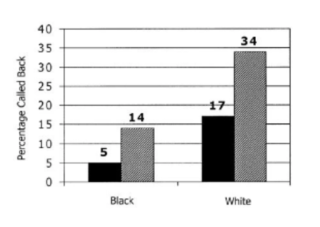Bias
The Science of Why Black People Root for Everybody Black
Black people feel that their fate is linked to other Black people's.
Posted August 22, 2019 Reviewed by Abigail Fagan

In 2017, at the Emmy Awards, Issa Rae, actress and producer of the HBO-hit Insecure, was asked who she was rooting for to win. "I'm rooting for everybody Black," Rae shared, provoking controversy among those who argued that her statement was racially biased. But Rae's comment gets at something deeper about the psychology of how Black people relate to one another.
The concept of "linked fate" was developed by political scientist Michael Dawson and indicates that Black people feel that their destinies are tied to the destinies of other Black people. When one Black person is racially discriminated against, it sends a symbolic message to all Black people that they too are vulnerable to this same type of discrimination, based on having a shared skin color. Thus, their destinies are linked. Research has found that Black people feel this sense of linked fate with one another because of their common vulnerability to racial discrimination. A report released in July of 2019 by Pew Research Center finds that Black people have a higher rate of linked fate than any other racial group.
Linked fate means that when one Black person succeeds, other Black people feel their success vicariously; one person’s success is the entire community’s. This leads to a communal rather than competitive dynamic among Black people, wherein Black people are willing to help one another.
Linked fate can also be traced back to a history of communalism among people of African descent. The South African concept of "Ubuntu" means "I am because we are." The term was coined in 1846, originating in the book Testamente Entsha by HH Hare. It became popularized in the west through the work of Nobel prize-winning archbishop and anti-apartheid activist Desmond Tutu. Ubuntu emphasizes a common humanity, highlighting how what happens to one person affects everyone.
The concepts of Ubuntu and linked fate differ, however, in that Ubuntu joins together all of humanity, whereas linked fate emphasizes a common bond among people of African descent. Is it unfair for Black people to feel for and support people who share their race? If White people embraced linked fate, then wouldn’t that be racist? To answer these questions, we must consider the larger political context in which different racial groups exist.

Research finds that a Black person is less likely to be called back for a job than a White person with a criminal record, even when the two share an identical resume. When Black students commit the same school infraction, multiple times, teachers are more likely to label Black students as troublemakers and deserving of more severe discipline than Whites.
One study presented research participants with a story about someone who committed a felony, and the race of the person in the story was manipulated to be either Black or White. The study found that both college students and police offers rated the person in the story as more culpable for the crime when they were Black versus White. The study also found that this bias in perceived culpability was stronger among police officers who unconsciously dehumanized Black people (demonstrated an unconscious association between Black people and apes).
With racial discrimination creating an environment that makes it more difficult for Black people to succeed, Black people counteract this unfairness through being willing to support one another. Thus, rather than being an unfair boon for Black people, linked fate and Black people’s resulting willingness to support other Black people, is a way to attempt to level the playing field amidst a group that continues to face striking disadvantage.
But this sense of community, this natural ability to feel for one another among Black people, also comes with a dark side. When harm befalls one Black person, the pain ripples throughout the Black community. Black people often experience personal distress in reaction to publicized police shootings aimed at other Black people. One research study found that police shootings of unarmed Black people are related to poorer mental health among Black people living in the state in which the shooting occurred. “‘Having seen something so horrific and traumatic that happened to someone else, I’m reminded in a very painful and salient way that the deck might be stacked against me,’” stated Atheendar S. Venkataramani, one of the study’s authors.
Linked fate is why harm to one Black person is often felt by all Black people, but also why Black people are rooting for everybody Black. Black people experience a collective emotional world. People of African descent have a long history of lifting each other up. Linked fate is the key to understanding why.
References
Bor, J., Venkataramani, A. S., Williams, D. R., Tsai, A. C. (2018). Police killings and their spillover effects on the mental health of Black Americans: a population-based, quasi-experimental study. The Lancet, 392, 302-310. doi:https://doi.org/10.1016/S0140-6736(18)31130-9
Goff, P. A., Jackson, M. C., Di Leone, B. A. L., Culotta, C. M., & DiTomasso, N. A. (2014). The essence of innocence: Consequences of dehumanizing Black children. Journal of Personality and Social Psychology, 106, 526-545.
http://dx.doi.org/10.1037/a0035663
Ho, A., Kteily, N. & Chen, J. (2017). “You’re one of us”: Black Americans’ use of hypodescent and its association with egalitarianism. Journal of Personality and Social Psychology, 113, 753-768. doi: 10.1037/pspi0000107.
Okonofua, J. A. & Eberhardt, J. A. (2015). Two-strikes: Race and disciplinary action in K-12 schooling.Psychological Science, 26, 617-624. doi: 10.1177/0956797615570365
Pager, D. (2003). The mark of a criminal record. American Journal of Sociology, 108, 937-975. doi:10.1086/374403
Pew Research Center (2019). Most U.S. adults feel what happens to their own racial or ethnic group affects them personally. Retrieved August 22nd, 2019 from https://www.pewresearch.org/fact-tank/2019/07/11/linked-fate-connectedn…


